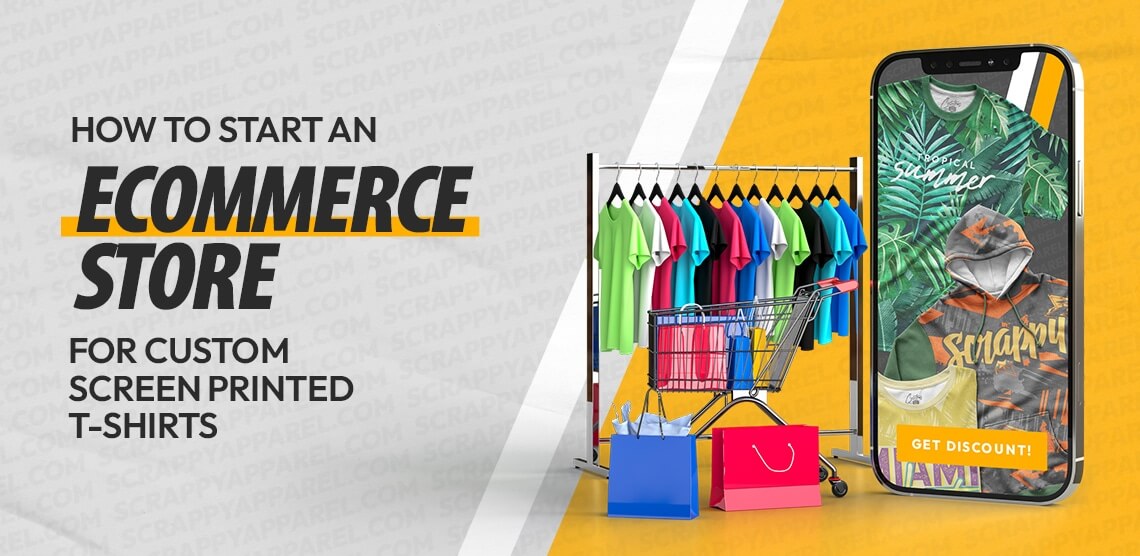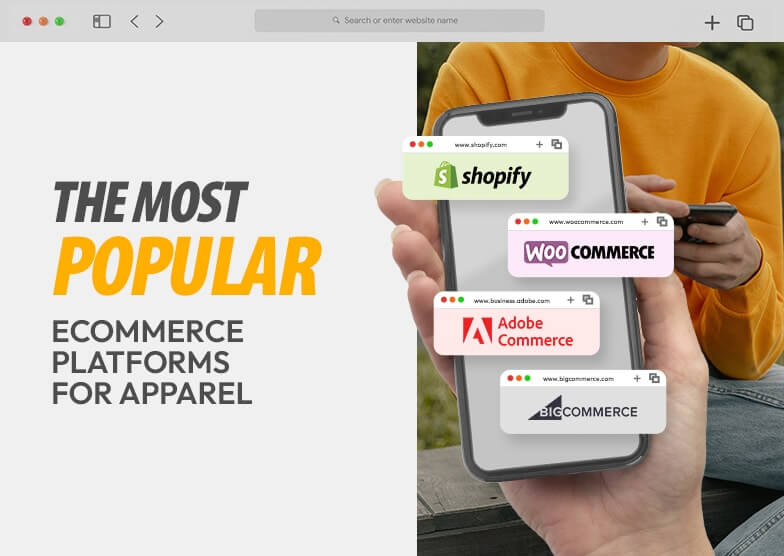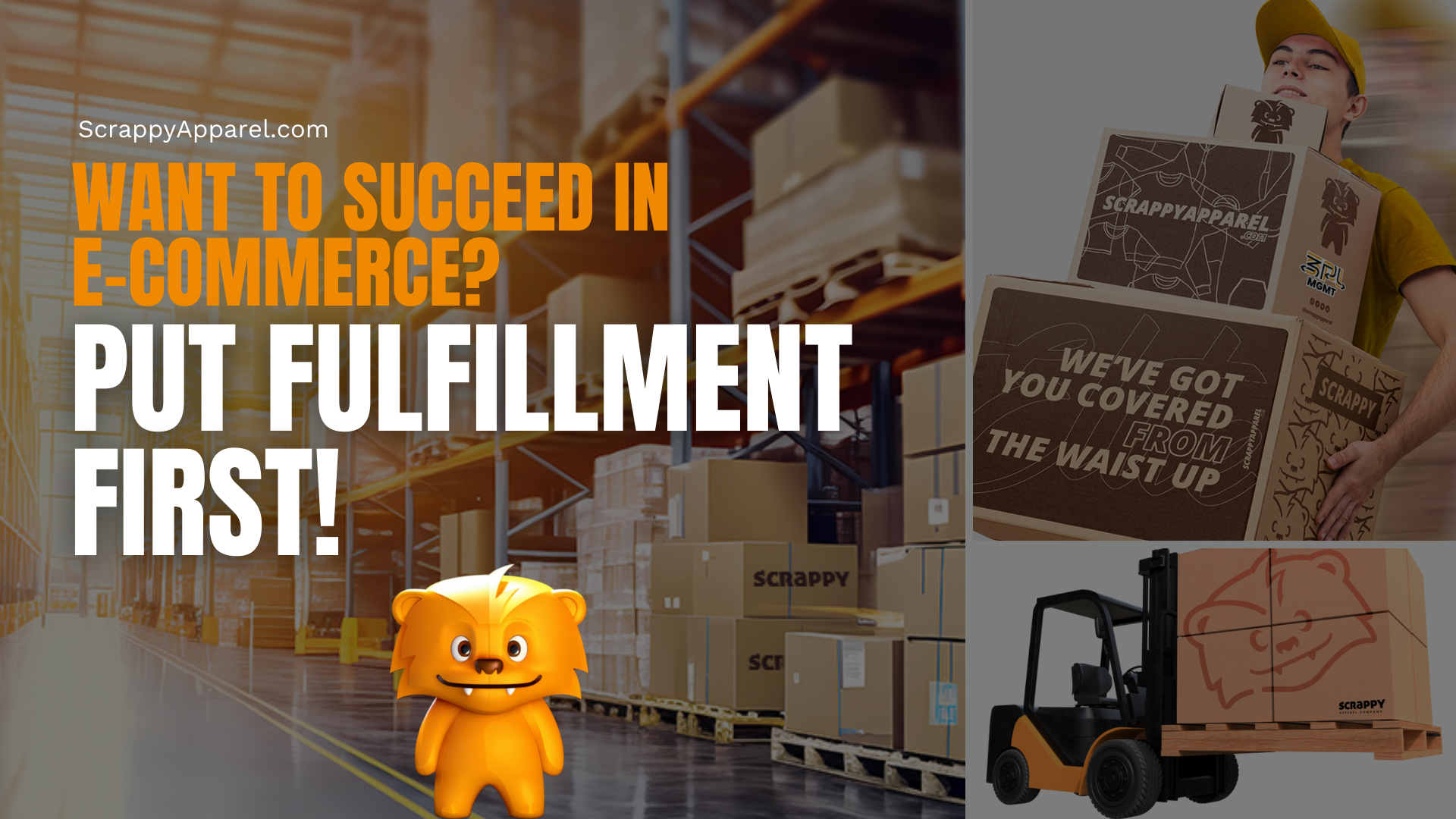How to Start an eCommerce Store for Custom Screen Printed T-Shirts
There’s no denying that eCommerce has revolutionized the way businesses operate. These days, businesses of all sizes can sell their products and services online with ease.
If you were born with a genius brain that comes up with fantastic graphics, why not sell them online and generate another stream of income? Turn your custom apparel into profit.
Starting an eCommerce store for screen-printed t-shirts is an excellent way of using your creativity and getting paid for it, too. Getting paid for your talent is a dream come true, don’t you think?
If you’re not sure where to start, don’t worry. We’ve got you covered. Here’s a deep dive guide into how to start an eCommerce store for custom screen printed t-shirts:
A Quick Overview of Types of eCommerce
So, starting an eCommerce store sounds like a tempting idea, doesn’t it? Well, before you run, you must learn how to walk, young grasshopper.
You must learn the basics of eCommerce in order to succeed. Let’s start off by checking out the eCommerce options themselves.
There are a few different types of eCommerce out there. Here’s a quick rundown of the most popular ones:
Business to Business (B2B)
This type of eCommerce occurs between two businesses rather than directly to customers, usually involving the sale of products or services. Companies that typically fall into this eCommerce category include manufacturing materials, clothing, car parts, etc.
Business to Consumer (B2C)
This is the most common type of eCommerce. This is when businesses sell products or services directly to consumers. An example of this would be buying a pair of shoes from an online retailer such as Zappos. Your custom screen printed t-shirts will likely be sold in a B2C model.
Consumer-to-Consumer (C2C)
This type of eCommerce occurs when consumers sell products or services to other consumers. This option is quite popular for people who create their own things like crafts and jewelry and sell them to other people. Think of platforms like Etsy or eBay.
Mobile Commerce (M-Commerce)
This type of eCommerce refers to any type of transaction that takes place using a mobile device, such as a smartphone or tablet. This eCommerce option is absolutely dominating our generation. I mean, just take a look at Amazon and Jeff Bezos’ $153 billion fortune. People love being able to buy everything online conveniently.
Social Commerce
This type of eCommerce takes place on social media platforms, such as Facebook, Twitter, or Instagram. It usually involves businesses selling products or services directly to consumers through these platforms. You know when you’re swiping around on Instagram and your favorite store posts a new shirt? We bet the picture is tagged directly to a product in an Instagram Shop. It’s ready for you to swipe (or in this case, tap) to complete your purchase. Yeah, that’s social commerce, and it is everyone’s weakness.
The Most Popular eCommerce Platforms for Apparel
Now that you know the types of eCommerce platforms out there, it’s time to familiarize yourself with the most popular ones. If you want to start an eCommerce store for custom screen printed t-shirts, these are some of the best platforms to do so:
Shopify
This is one of the most popular eCommerce platforms, especially for apparel. Shopify is a platform that provides users with everything they need to create and run their own online store. You don’t need any prior coding experience or knowledge to use Shopify, which makes it ideal for beginners.
WooCommerce
WooCommerce is a WordPress plugin that turns your WordPress website into an eCommerce store. WordPress is a popular content management system (CMS) that helps you create and manage your website. It’s not as user-friendly as Shopify, but once you get the hang of it, it’s actually quite easy to use.
BigCommerce
BigCommerce is another excellent platform for creating an online store. It’s similar to Shopify in terms of features and ease of use.
Adobe Commerce Cloud
Adobe Commerce Cloud is a platform that helps you create personalized shopping experiences. It’s a great choice if you want to offer a unique and tailored experience to your customers.
Inventory Options for Your Dope Shirt
In order to sell custom screen printed t-shirts online through eCommerce, you have to build up your inventory. There are different types of inventory that you need in order to succeed in eCommerce.
Product Inventory
The product inventory is the most important type of inventory for eCommerce businesses, as it includes all the products that are available for sale on the website.
There are a few different ways to set up product inventory, and the best method depends on the type of products being sold. For example, if you’re selling physical goods, you’ll need to keep track of how many units are in stock and how often they need to be replenished.
Stock Inventory
The stock inventory is also important, as it includes all the products that are in stock and ready to be shipped. There are a few things to consider when setting up stock inventory for your business. Here are some best practices to follow:
- Keep track of what you have in stock. This may seem like a no-brainer, but it’s important to know exactly what products you have on hand at all times. This will help you avoid over-ordering or running out of inventory.
- Consider your storage needs. Where will you store your inventory? Do you have enough space to accommodate all of your products? Will you need to rent additional storage space?
- Determine how much inventory you need on hand. This will vary depending on the type of business you have, but it’s important to have enough inventory to meet customer demand without tying up too much capital in inventory.
- Review your inventory regularly. This will help you keep track of what’s selling and what isn’t so you can make adjustments as needed.
Backorder Inventory
The backorder inventory is less important, as it includes all the products that are out of stock and need to be ordered from the supplier. Still important, nevertheless.
One of the best ways to set up backorder inventory is to use software that can automate the process. This will help ensure that your backorders are fulfilled in a timely and accurate manner. Additionally, it can also help you keep track of your inventory levels, so you know when to restock.
Another great way to set up backorder inventory is to use a service that specializes in it. This can help you save time and money, as well as ensure that your backorders are fulfilled correctly. Additionally, these services often offer other benefits, such as inventory management and tracking.
Finally, you can always set up your own backorder system. This may take some time and effort, but it will be worth it in the end. Not only will you be able to save time and money, but you’ll also have complete control over your inventory. Additionally, you can customize your system to fit your specific needs.
If you are just starting out, it is probably best to start with product inventory. This is the simplest type of inventory, and it will give you a good idea of what products are available for sale on your website. As you grow, you can add stock inventory and backorder inventory to your website.
Fulfillment Options to Fulfill Your Dreams
So now that you’ve got your eCommerce store set up and your inventory is up to date and ready to go, you need to figure out your fulfillment process for when those orders start to come through. Here are a few different fulfillment options.
Self-Fulfillment
You fulfill all orders yourself. You will need to have storage space for inventory and potentially staff to package and ship the orders.
Dropshipping
This option involves partnering with a supplier who will ship the orders directly to the customer.
Third-Party Fulfillment
You partner with a third-party fulfillment company that will store, package, and ship the orders.
Print-On-Demand
This option involves partnering with a print-on-demand company that will print and ship the orders.
And many, many, many more. You would not believe the fulfillment options you have. The key is researching what works best for you based on your goals AND your budget.
How To Kickstart Your Kick-Ass eCommerce Store
We can teach you all the basics to know about starting an eCommerce store for custom screen printed t-shirts. However, what you truly need is to know just how to get started. Check out this free resource for building a brand from scratch.
Starting an eCommerce store can be a daunting task, but with the right planning and execution, it can be a successful endeavor. Here are some tips to get you started:
Do Your Research
Before you launch your store, it’s important to do your research and understand the eCommerce landscape. This will help you create a realistic business plan and set yourself up for success.
Define Your Target Market
Who are you selling to?
What are their needs and wants?
What motivates them to buy?
Answering these questions will help you create a powerful marketing and sales strategy for your eCommerce store.
Research Your Competition
Who are they?
What are they doing well?
What could you do better than them?
Knowing your competition will help you create a unique selling proposition (USP) for your eCommerce store.
Know Your Product Inside and Out
What are you selling?
What are its features and benefits?
What makes it unique?
Answering these questions will help you create compelling copy and product descriptions for your eCommerce store.
Discover Your Niche
One of the keys to success in eCommerce is finding your niche. Your niche is what sets your store apart from the millions of other eCommerce stores out there. It’s what makes you unique and attractive to your target customers.
Without a niche, you’re just another store selling stuff online. But with a niche, you can be the go-to destination for a particular type of product or service. You can achieve this by identifying a need in the market that is not being met, or by catering to a specific demographic.
Create a Strong Branding Strategy
Your branding will be one of your most powerful marketing tools, so it’s important to put thought into your branding strategy from the beginning.
Why is branding so important for eCommerce businesses? Well, consider this: in a world where there are literally millions of online stores competing for attention, your store needs to stand out from the crowd.
A strong brand will help you do that. It will give your store identity and personality that customers can connect with, and it will make you more visible and memorable in a sea of online options. Your logo, color palette, and overall look and feel contribute to your brand.
Build a User-Friendly Website
Your website is often the first impression potential customers will have of your business, so it’s important to make sure it’s user-friendly and visually appealing.
A user-friendly website is important for a number of reasons. It will make it easier for potential customers to find your site and navigate around it. It will build trust with your customers, as they’ll be able to easily find what they’re looking for and won’t be put off by a confusing or difficult-to-use website. A user-friendly website will help to boost your search engine rankings because search engines favor sites that are easy to use.
Invest in Marketing
To drive traffic to your website and generate sales, you’ll need to invest in marketing. For example, search engine optimization, social media marketing, and email marketing are great investments to make. If you need more inspiration, check out our guide on 100 Ways to Market Your Custom Apparel.
Offer Exceptional Customer Service
Finally, it’s important to offer excellent customer service. You know, like promptly responding to customer inquiries, handling complaints in a professional manner, and going above and beyond to exceed customer expectations. Having great customer service allows your new customers to not only leave happy, but feel trust in your brand.
You’re Ready to Run!
If you’ve gotten this far, congratulations! You are now ready to start your very own eCommerce store for custom screen printed t-shirts. Remember, do your research depending on your needs and budget and always keep your end goal in mind.
Our last gift to you is this free eCommerce store planner so that you can get everything prepared, planned, and ready to rock.











